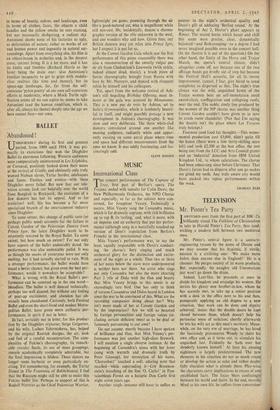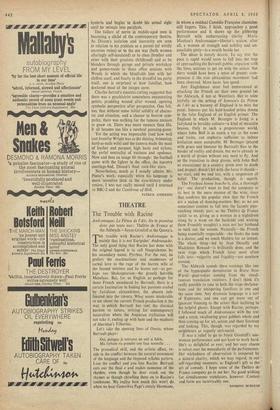In middle age 1 can still enjoy only the first
hundred pages or so of Dr. Howard's edition of the original text, with their pawky humour and rather spinsterish malice: George Pontifex mak- ing conventional responses to Alpine scenery and the approved Italian masters; the appalling fit of rage with the butler in the wine-cellar when the bottle of Jordan water gets broken; the equally alarming explosion when the peppery old party finds that the lobster sauce has not been made with a hen lobster; Theobald ringing the bell for family prayers, 'red-handed as he was,' after thrashing Ernest for his inability to say 'come' instead of 'turn'; the awful Dr. Skinner's 'small piece of bread and butter' which is metamor- phosed into a good plate of oysters, a scallop shell of minced veal nicely browned, some apple tart, and a hunk of bread and cheese; followed not by the original glass of cold water but by gin and water, 'hot and stiff too.' These scenes still seem to me classically funny; and Christina, of course, is a triumph, day-dreaming over her poor Ernest-CEdipus. But the development of the story, with its dung-beetle-trundling obses- sion with money (anal-erotic?), is fearfully boring, because Butler's solution to life's problems is too simple. Norman Douglas once said that D. H. Lawrence had 'opened a small window for the middle classes.' Butler certainly did that, but there is no basic criticism of the nineteenth-century social structure in his famous book.
He was an oddity, and therefore worth cherishing. There is real feeling in Alps and Sanctuaries and the Notebooks still make stimu- lating reading. As an eccentric he holds his own
with the most agreeably screwy eighteenth-cen- tury 'characters.' His best prose is sound and unmannered— Orwell should have written about
him—but as a thinker he can scarcely be said to exist. His flat and laboured. pastiches of Handers music reveal all too clearly his i'ntellec- tual and emotional defects. On the other hand, nothing is more entertaining than to read about him, as Hugh Kingsmill, Malcolm Muggeridge and Philip Henderson have proved. It does not matter that many of his works- -Erewhon and its sequel, alas, included- -remain on the shelf.
secondary modern where he teaches (and hates teaching) by such means as a prolonged sick- leave and a `Leadswinger Fellowship.' If we could be more interested in Abel we could better see the justifiability of the elaborate technique. But a noble failure is better than an ignominious success.
Powdered Eggs is less experimental than it looks. Charles Simmons doesn't believe in para- graphing, so his supra-periodic unit has to be the chapter. You will have guessed that the method is that of the thinktape, the mind-empty- ing of a young New Yorker who is seeking manu- mission from institutional pressures (church, state, job, love) in the weary contemporary manner. He is funny, though, often very funny, and the candour is not archly contrived, but innocently engaging. Everything is suspect, in- • eluding sex, including even the novel itself, and the prose- though often tempted—refuses to settle into self-conscious attitudes, bits of 'brilliance.' Life, says the hero, 'is full of sur- prises. Prudence is pregnant, which sounds like a contradiction in terms.' There are other sur- prises, but they are the surprises which hit a decent sOphornore with healthy prejudices. It is the combination of wit and innocence which makes this book a very acceptable piece of post- Sal ingerism.
A New Turn on the Old Ferris-Wheel
Powdered Eggs. By Charles Simmons. (Anthony Blond, 21s.) Yes from No-man's Land. By Bernard Kops. (MacGibbon and Kee, 25s.)







































 Previous page
Previous page